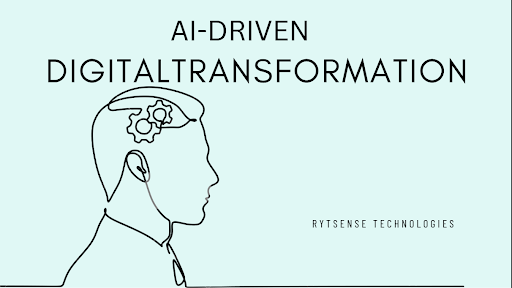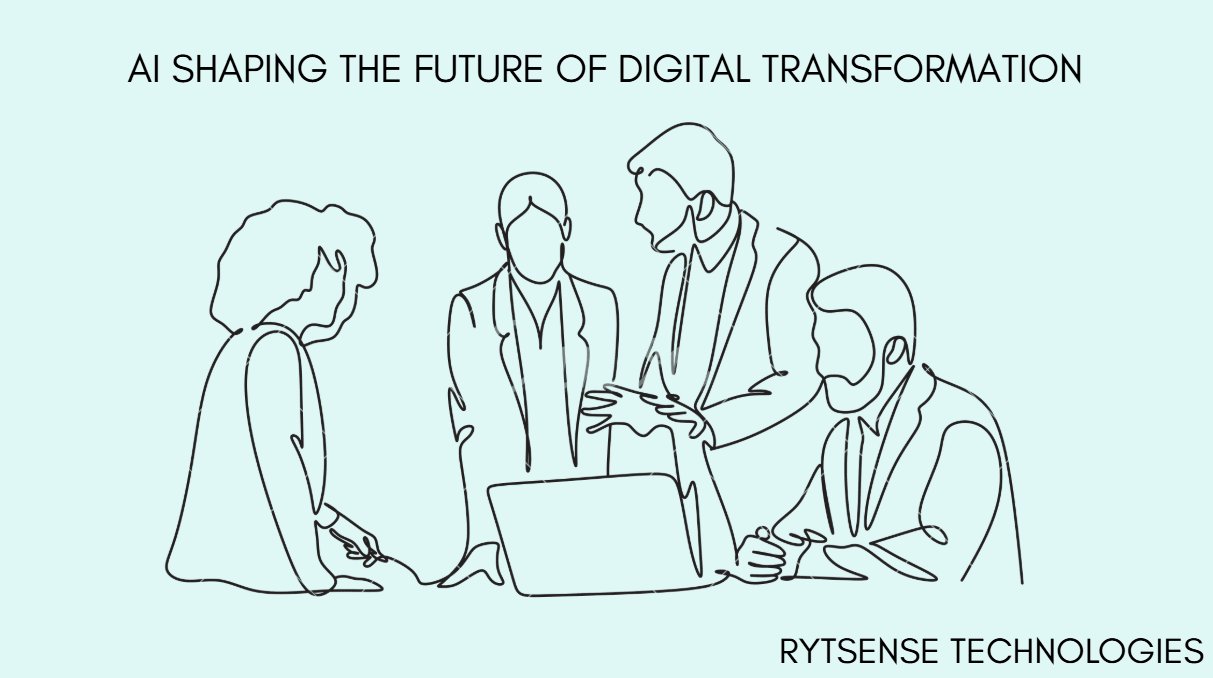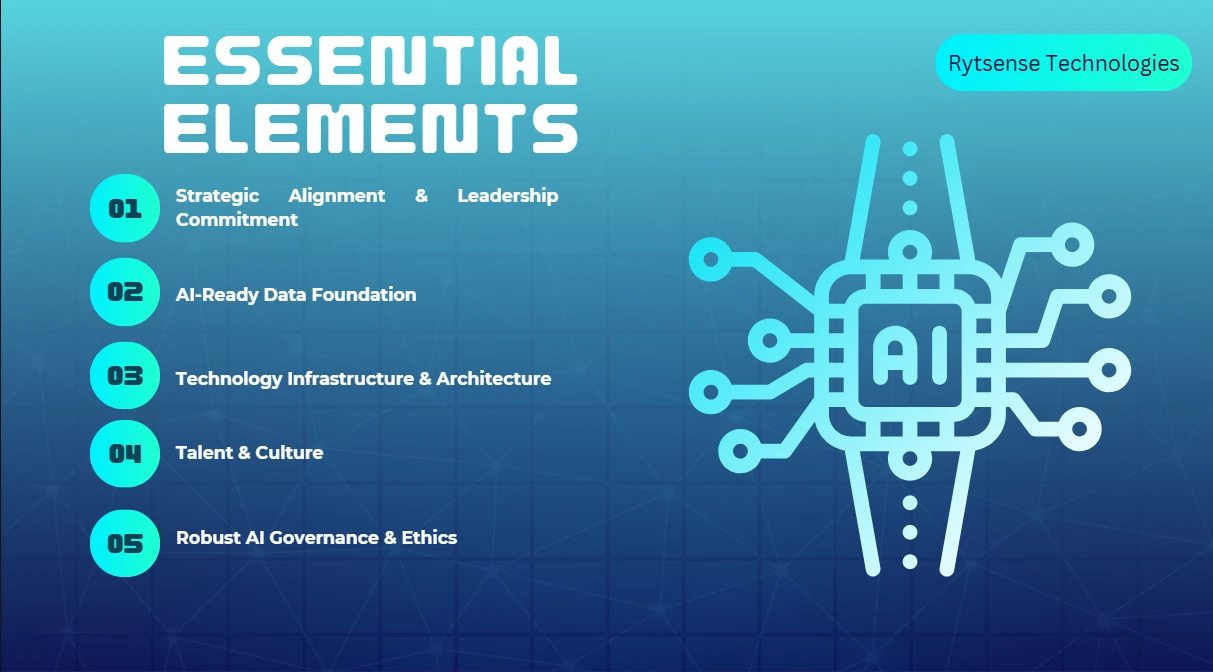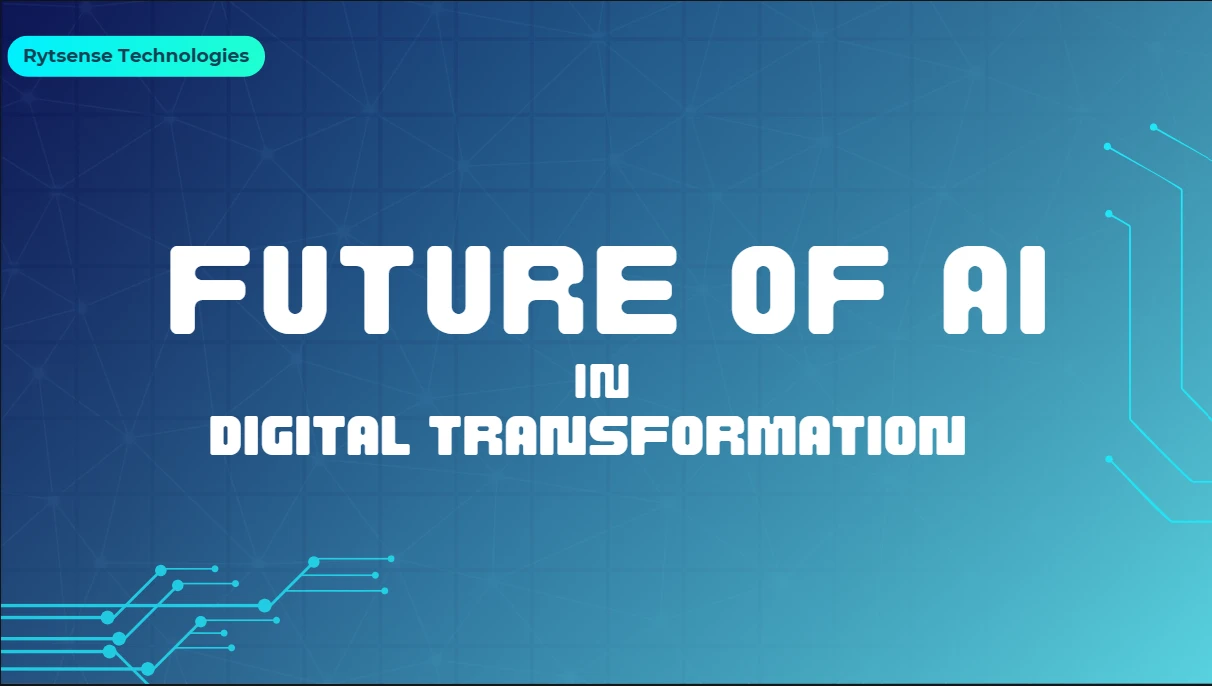How AI Driven Digital Transformation Is Shaping the Future: A Deep Dive into the Next Era of Business

We stand at the precipice of a business revolution, not driven by a single technology, but by the powerful convergence of artificial intelligence and holistic digital transformation. This fusion AI-driven digital transformation —is no longer a futuristic concept; it's the core foundation for organizations striving for resilience, innovation, and competitive dominance.
While digital transformation fundamentally reimagines processes and customer engagement through technology, AI acts as the intelligent engine supercharging this evolution. Forget incremental improvements: we're talking about transformational shifts in efficiency, decision-making, and value creation.
Consider this: A recent TDWI Best Practices Report revealed that approximately 75% of organizations now rate AI as "very important" or "somewhat important" to achieving their core digital transformation goals, which overwhelmingly focus on increased operational efficiency, superior data-driven decisions, and enhanced customer experiences.
McKinsey's 2025 research states that "AI has the potential to contribute $4.4 trillion to productivity," but while 92% of companies say they "intend to increase investment in AI," only 1% are fully AI-enabled.
Only about 10% dismiss its significance. This blog delves deep into how this powerful synergy is reshaping industries, the critical components for success, and the undeniable trajectory towards an AI-first future.
While digital transformation fundamentally reimagines processes and customer engagement through technology, AI acts as the intelligent engine supercharging this evolution. Forget incremental improvements: we're talking about transformational shifts in efficiency, decision-making, and value creation.
Consider this: A recent TDWI Best Practices Report revealed that approximately 75% of organizations now rate AI as "very important" or "somewhat important" to achieving their core digital transformation goals, which overwhelmingly focus on increased operational efficiency, superior data-driven decisions, and enhanced customer experiences.
McKinsey's 2025 research states that "AI has the potential to contribute $4.4 trillion to productivity," but while 92% of companies say they "intend to increase investment in AI," only 1% are fully AI-enabled.
Only about 10% dismiss its significance. This blog delves deep into how this powerful synergy is reshaping industries, the critical components for success, and the undeniable trajectory towards an AI-first future.
How is AI Shaping the Future of Digital Transformation?

AI isn't just enhancing digital transformation; it's fundamentally redefining its scope, speed, and impact. Traditional digitalization focused on moving analog processes online. AI injects intelligence, enabling autonomous learning, prediction, adaptation, and action.
From Automation to Autonomous Optimization
Basic automation (RPA) was used for regulated tasks in the initial phases of digital transformation. AI-driven transformation employs machine learning (ML) and predictive analytics to continuously optimize processes. For instance, predictive maintenance in manufacturing, powered by AI analyzing sensor data, doesn't just alert to failures; it predicts them before they happen, scheduling maintenance optimally and limiting operating costs by 10–20%.
Hyper-Personalization at Scale
Digital channels provided reach; AI provides deep, individualized relevance. By analyzing vast datasets in real-time (purchase history, browsing behavior, social sentiment, even contextual factors), AI enables hyper-personalized marketing, product recommendations, and customer service interactions. According to Boston Consulting Group, businesses that use AI for personalization claim revenue growth of 6–10% and rates that are two–three times faster than those of their competitors who do not use AI.
Data as a vital source and AI as the computing unit
Digital transformation generates oceans of data. Only artificial intelligence is able to obtain valuable information from this barrage of data. AI-powered analytics move beyond descriptive ("what happened?") to predictive ("what will happen?") and prescriptive ("what should we do?"). More than 80% of businesses will have implemented generative AI-enabled apps in production settings by 2026, highlighting the rapid shift towards AI-driven insight generation
Accelerating Innovation Cycles
AI significantly reduces the time between conception and execution. Generative AI (GenAI) is particularly transformative, assisting in rapid prototyping, code generation (GitHub Copilot claims it helps developers code up to 55% faster), synthetic data creation for training models, and even designing marketing materials. This accelerates product development and service innovation.
Want to future-proof your business with AI-powered transformation?

What are the essential elements of an effective AI-driven digital transformation?

Success hinges on more than just purchasing AI tools. It requires a strategic foundation built on several interconnected pillars:
Strategic Alignment & Leadership Commitment
- Deep Integration: AI initiatives must be intrinsically tied to core business objectives (e.g., reduce customer churn by improving supply chain efficiency by Y%; launch a new AI-powered service line). This requires active sponsorship and understanding from the C-suite.
- Investment Beyond Tech: Success demands investment in talent, change management, and continuous learning, not just software licenses.
AI-Ready Data Foundation
- Quality & Governance Paramount: "Low-quality data yields unreliable results" is exponentially true for AI. Robust data governance frameworks ensuring accuracy, consistency, accessibility, and security are non-negotiable. According to studies, 60–80% of data scientists' effort is spent cleaning and preparing data; this significant inefficiency can be resolved with appropriate data readiness.
- Mastering Master Data: Particularly in complex systems like SAP, managing master data (customers, vendors, materials) is critical. Predictive AI can revolutionize this, pre-filling fields based on historical patterns (e.g., suggesting material classifications with SAP AI solutions reduces master data errors by 70%), shifting effort from data entry to validation, drastically improving quality and efficiency. Flawed master data directly impacts downstream AI accuracy and business process reliability.
Technology Infrastructure & Architecture
- Scalable & Flexible: The infrastructure must support data ingestion, processing, model training/deployment, and real-time inference at scale.
- Integration Capabilities: Seamless integration with existing core systems (ERP, CRM, SCM) and new AI tools is vital. APIs and microservices architectures facilitate this.
- Toolchain Selection: Choosing the right mix of tools—data lakes/warehouses, ML platforms (SageMaker, Vertex AI, Azure ML), MLOps tools, GenAI APIs, and potentially specialized AI software development frameworks.
Talent & Culture
- Multi-Disciplinary Teams: Success requires collaboration between data scientists, ML engineers, data engineers, domain experts (SMEs), business analysts, software developers, and ethical AI specialists. Upskilling existing staff is as crucial as hiring new talent.
- "Hire AI Developers" Strategically: Building internal capability often means knowing when to hire AI developers—either permanently or through strategic partnerships with an experienced AI development company. Focus on skills in ML, deep learning, data engineering, and specific domain applications.
- Cultural Shift: Fostering a data-driven, experimentation-friendly culture that embraces AI and understands its potential and limitations is essential. Overcoming fear of job displacement through reskilling is critical.
Robust AI Governance & Ethics
- Beyond Compliance: Establishing frameworks for fairness, transparency, explainability, accountability, and privacy throughout the AI lifecycle. This includes model monitoring, bias detection/mitigation, and clear guidelines for GenAI use.
- Risk Mitigation: Google's Gemini image generation faults highlight the moral dilemmas (2024).
Know More: How to Become AI Developer: Skills, Courses & Roadmap
How is AI Reshaping Digital Transformation Strategies?
Shift from Siloed Projects to Enterprise-Wide AI Platforms
Strategies are moving away from one-off AI proofs-of-concept towards building centralized, reusable AI platforms and capabilities that can be leveraged across multiple business units and functions. This improves efficiency, consistency, and scalability.
Data Strategy as the Core
AI-driven digital transformation elevates data strategy from an IT concern to the absolute core of business strategy. The focus is on treating data as a strategic asset, ensuring its flow, quality, and accessibility fuel the AI engine.
Emphasis on Continuous Learning & Adaptation
Static transformation roadmaps are obsolete. AI-powered businesses operate in feedback loops. AI models continuously learn from new data and outcomes, requiring strategies that embrace agility, rapid experimentation (A/B testing AI models), and the ability to pivot based on AI-generated insights. The "AI-driven improvement loop"—where AI automates processes, improving data quality, which in turn trains better AI models—becomes central.
Customer Centricity Powered by Prediction
Strategies are increasingly built around anticipating customer needs using AI, moving beyond reactive service to proactive engagement and hyper-personalized experiences delivered at the right moment through the right channel.
New Business Model Innovation
AI enables entirely new revenue streams and value propositions. Think "as-a-service" models powered by AI analytics (e.g., predictive maintenance as a service), AI-powered marketplaces, or personalized product creation enabled by GenAI. Strategies must explicitly explore these disruptive opportunities
AI & Digital Transformation: The Synergistic Engine
This section delves into the mechanics of the synergy, moving beyond definitions:
AI as the Intelligent Automation Layer
While RPA handles simple, repetitive tasks, AI tackles complex processes requiring judgment, pattern recognition, and learning. AI analyzes unstructured data (emails, documents, images, sensor feeds) that traditional automation cannot, significantly broadening the scope of what can be automated. McKinsey estimates, ”The World Economic Forum predicts AI will displace 85M jobs but create 97M new roles by 2025.” The net impact varies by sector and geography.
Transforming Decision-Making from Gut Feel to Data-Driven Certainty
AI processes vast, complex datasets far beyond human capacity, identifying subtle correlations and predicting outcomes with increasing accuracy. This shifts decision-making from hierarchical and often slow processes to faster, more decentralized actions based on AI insights. For example, AI-powered supply chain tools can optimize routes and inventory in real-time based on predicted demand fluctuations, weather, and geopolitical events, potentially reducing logistics costs by 15-30%.
The Gen AI Revolution Within Transformation
- Accelerating Development: Generating code, test cases, and documentation speeds up AI software development cycles.
- Democratizing Data & Insights: Natural language interfaces allow non-technical users to query data and generate reports using simple prompts, breaking down data silos.
- Enhancing Creativity: Assisting in design, content creation, and brainstorming new product ideas.
- Revolutionizing Customer Interaction: Powering next-generation, context-aware chatbots and virtual agents.
Building the AI-First Organization
The ultimate goal is integrating AI into the core fabric of operations, where it informs strategy, drives daily processes, and continuously enhances customer and employee experiences. This requires the foundational components (data, talent, infrastructure) and cultural shift mentioned earlier.
How AI is Transforming Consulting: A Comparison of Two Perspectives
The rise of AI-driven digital transformation is reshaping the consulting landscape, leading to two distinct, yet sometimes converging, perspectives:
Perspective 1
The Evolution of the Conventional Strategy House (Top-Down)
- Focus: Integrating AI expertise into established strategic frameworks. Advising on AI's impact on business models, competitive dynamics, market entry, and M&A. High-level roadmap creation, organizational design for AI, and AI governance/ethics strategy.
- Strengths: Deep industry knowledge, trusted advisor relationships with C-suite, and understanding of complex organizational dynamics and change management.
- AI Integration: Leveraging AI (often GenAI) internally for market research synthesis, scenario planning, report generation, and identifying patterns in client data to inform strategy. collaborating on implementation with a specialized AI software development company.
- Value Proposition: Helping clients navigate the strategic imperative of AI, ensuring alignment with overall business goals, managing risk, and securing leadership buy-in.
Perspective 2
The Tech-Enabled Specialist (Bottom-Up)
- Focus: Deep technical expertise in AI/ML, data engineering, and AI software development. Building and deploying custom AI solutions, implementing AI operations platforms, managing data platforms, and providing specialized AI talent (augmented teams or full outsourcing—hire AI developers). Often emerges from a strong IT services or pure-play AI development company background.
- Strengths: Cutting-edge technical skills, rapid prototyping and implementation capabilities, and hands-on experience with diverse AI tools and cloud platforms. The capacity to provide concrete AI integrations and assets.
- AI Integration:AI is the core product/service. Using AI extensively in their own delivery processes (automated testing, code generation, and predictive project management).
- Value Proposition: Solving specific, high-impact business problems with bespoke AI solutions, accelerating time-to-value for AI initiatives, and providing hard-to-find technical talent.
Convergence & The Winning Formula
The most effective consulting approach increasingly blends these perspectives. Traditional firms are building or acquiring deep AI technical capabilities. Tech specialists are developing stronger strategic advisory capabilities. The winners will be those who can seamlessly combine strategic vision with technical execution prowess, offering end-to-end AI-driven digital transformation services. Clients need advisors who understand both why AI matters strategically and how to implement it effectively and responsibly.
Top Recommendations for AI-Driven Digital Transformation Solutions in 2025
Navigating the vendor landscape is crucial. Here are key solution categories and leading considerations for 2025:
Unified Data & AI Platforms
- Why: Give AI a single source of truth by removing data silos. Essential for scalability and governance.
- Key Players: Databricks (Lakehouse Platform), Snowflake (Snowpark for ML, Cortex for GenAI), Google Cloud (BigQuery ML, Vertex AI), Microsoft Azure (Synapse Analytics, Azure ML), and AWS (Sagemaker, Redshift ML).
- Focus: Evaluate data integration capabilities, scalability, built-in ML/GenAI tools, security, governance features, and cost-effectiveness.
Generative AI (GenAI) Toolkits & Application Enablers
- Why:Rapidly infuse GenAI capabilities into applications and workflows (content creation, code generation, summarization, conversational AI).
- Key Players: OpenAI (ChatGPT APIs, GPT models), Anthropic (Claude), Google (Gemini API), Microsoft (Azure OpenAI Service), and Cohere, along with application-layer platforms like Microsoft Copilot Studio, Google Duet AI, and Salesforce Einstein GPT.
- Focus:Model capabilities (quality, context length), cost, ease of integration, customization/fine-tuning options, security, and compliance features. Consider vendor lock-in risks.
AI-Powered Process Mining & Task Mining
- Why:Objectively discover process inefficiencies, bottlenecks, and automation opportunities by analyzing system logs and user interactions. Provides the baseline for effective automation (RPA + AI).
- Key Players: Celonis, UiPath Process Mining, IBM Process Mining, Software AG (ARIS), and ABBYY Timeline.
- Focus: depth of process discovery, root cause analysis capabilities, integration with automation platforms, and simulation features for "what-if" scenarios.
Hyperautomation Suites
- Why:Combine RPA, AI (ML, NLP, computer vision), and process mining to automate complex end-to-end processes involving structured and unstructured data.
- Key Players:UiPath, Automation Anywhere, Microsoft Power Automate (incorporating RPA, AI Builder, and Process Advisor).
- Focus: ease of use for citizen developers, breadth of AI capabilities (document understanding, sentiment analysis), cognitive automation features, scalability, and management console capabilities.
Specialized AI Solutions for Core Functions
- CRM: Salesforce Einstein, HubSpot AI, Zoho Zia (AI for sales forecasting, lead scoring, personalized marketing, and service automation).
- ERP: SAP S/4HANA with embedded AI/ML, Oracle Fusion Cloud Applications AI (AI for predictive procurement, intelligent financial closing, and supply chain risk management).
- HCM: Workday Skills Cloud, People Analytics; Beamery, The Eightfold AI (AI for workforce management, skills gap analysis, customized learning, and talent acquisition).
- Cybersecurity: Darktrace (AI Defense), CrowdStrike (Charlotte AI), Palo Alto Networks (Cortex XSIAM). (AI for security posture analysis, autonomous response, and detection of risks).
AI operations Platforms
- Why: Manage the full lifecycle of production ML models (development, deployment, monitoring, and retraining) efficiently and reliably. Critical for moving beyond POCs.
- Key Players:Domino Data Lab, DataRobot, Comet ML, Weights & Biases, and cloud-native tools (Azure ML AI operations platforms and Vertex AI Pipelines).
- Focus: Collaboration features, experiment tracking, model versioning, deployment flexibility, monitoring capabilities (drift, performance), and governance integration.
- Choosing Wisely: Prioritize solutions that offer strong integration capabilities, scalability, robust security, and clear ROI pathways. Pilot extensively. Consider partnering with a best AI development company or consultancy for unbiased vendor selection and implementation support.
Build responsible AI systems from day one.

AI Agent Integration: Transforming Workflow
This heading speaks to a critical emerging capability: designing and implementing intelligent AI agents within complex business workflows. This is where deep expertise separates success from stalled projects.
Beyond Chatbots
AI Agents' Ascent: Artificial intelligence (AI) agents are semi-autonomous or autonomous systems that sense their surroundings, decide what to do, and act to accomplish predetermined objectives within predetermined workflows.
They go beyond simple chatbots to handle multi-step tasks, reason, and interact with various systems.
Workflow-Centric Design
Success starts with a deep understanding of the entire workflow—its steps, actors, decision points, data inputs/outputs, pain points, and desired outcomes. Expertise in process mapping and optimization is a prerequisite.
Strategic Agent Definition
- Identify Automation & Augmentation Opportunities: Pinpoint tasks suitable for full automation (e.g., data retrieval, report generation) vs. tasks where agents augment human workers (e.g., providing real-time recommendations during a customer call, summarizing complex documents for faster review).
- Define Agent Scope & Goals: Clearly articulate what the agent does, its boundaries, success metrics, and how it integrates with human steps.
Technical Integration Expertise
- Orchestration: Building the "conductor" layer that sequences agent tasks, manages handoffs between agents/humans, and handles exceptions. Tools like LangChain, LlamaIndex, or custom microservices are key.
- API & System Connectivity: Seamlessly connecting agents to legacy systems, databases, cloud services, and communication channels requires robust API management and integration skills.
- Agent Toolkits: Leveraging frameworks (e.g., AutoGen, LangGraph) or building custom logic using LLMs (OpenAI GPT, Claude, Gemini) combined with function calling and retrieval-augmented generation (RAG).
Product Management for AI Agents
- UX for Hybrid Workflows: creating user-friendly dashboards, chat, audio, and notification interfaces for human-agent communication.
- Performance Monitoring & Continuous Improvement: Tracking agent accuracy, task completion rates, latency, user satisfaction, and business impact. Creating feedback loops for improvement and retraining.
- Scalability & Reliability: Ensuring agents perform consistently under load and handle edge cases gracefully.
The Value Proposition
Companies possessing this deep expertise in AI agent integration and workflow-centric product strategy unlock transformative gains: drastically reduced process cycle times, minimized errors, enhanced employee productivity, superior customer service resolution, and the ability to dynamically adapt workflows based on real-time AI insights. Partnering with an AI development company in the USA or globally that excels in this specific domain is often essential for complex implementations.
Know More: How AI Decision-Making Is Transforming Industries Across the Globe
Know More: How AI Decision-Making Is Transforming Industries Across the Globe
What is the future of AI in digital transformation?

The trajectory points towards deeper integration, greater autonomy, and more profound business impact:
Ubiquitous AI
AI will become an invisible, embedded layer within virtually all enterprise software and operational processes. It will be as fundamental as databases are today.
The Rise of Autonomous Enterprises
Moving beyond automating tasks towards automating complex decisions and actions within defined boundaries. AI systems will manage significant portions of operations (supply chain optimization, dynamic pricing, fraud detection/resolution, and IT system management) with minimal human intervention, reacting in real-time to changing conditions.
Hyper-Personalization Evolution
AI will move beyond recommending products to anticipating needs and proactively offering solutions or experiences, potentially before the customer explicitly recognizes the need themselves, leveraging real-time contextual data from IoT and ambient computing.
Generative AI Maturity & Integration
GenAI will move beyond novelty to core operational use.
- Automated Knowledge Work: Drafting complex documents (contracts, reports, code), conducting research summaries, and managing routine communications.
- AI Co-Pilots for Every Role: Deeply integrated assistants for developers, marketers, designers, financial analysts, and customer service reps, enhancing productivity.
- Personalized Simulation & Training: Creating dynamic, AI-generated simulations for employee training and scenario planning.
AI for Sustainability & Resilience
Increasingly critical applications in optimizing energy use, predicting and mitigating supply chain disruptions, designing sustainable products, and monitoring environmental impact.
The Convergence of AI and Human Intelligence
The future will see increasingly sophisticated human-AI collaboration. AI will augment human capabilities, allowing professionals to focus on higher-value, creative, and strategic tasks while AI handles routine, data-intensive, or predictive work. This symbiotic relationship will unlock unprecedented levels of innovation and efficiency.
Focus on Explainability, Trust & Ethics
As AI becomes more autonomous, ensuring transparency, fairness, and robustness will be paramount. Regulations will evolve rapidly. Trust will become a key competitive differentiator.
What differentiates AI transformation from digital transformation?
Digital Transformation (DX)
- Core Goal: Leverage digital technologies to fundamentally change how a business operates and delivers value to customers. It's about process re-engineering and cultural shift enabled by technology.
- Scope: Broad. It encompasses adopting cloud computing, implementing CRM/ERP systems, developing digital customer channels (web, mobile apps), utilizing data analytics, automating processes (RPA), improving collaboration tools, and fostering a digital-first culture.
- Focus: digitizing existing processes, improving efficiency, enhancing customer experience through digital means, and becoming more agile and data-informed.
- Technology Role: Technologies (cloud, mobile, analytics, and basic automation) are enablers of the transformation.
AI-Driven Digital Transformation
- Core Goal: Embed artificial intelligence as the intelligent core of the business to drive new capabilities, automate complex decision-making, enable hyper-personalization, and unlock entirely new business models. It's about infusing intelligence into operations and strategy.
- Scope: A specific, advanced subset or evolution of digital transformation. Focuses specifically on leveraging ML, deep learning, NLP, computer vision, and GenAI.
- Focus: Transitioning from digitalization to predictive/prescriptive intelligence and cognitive automation. Creating self-optimizing systems, hyper-personalized experiences at scale, data-driven innovation, and autonomous operations. It fundamentally changes what the business can do.
- Technology Role: AI (particularly advanced ML and GenAI) is the primary driver and defining characteristic of the transformation. It's not just an enabler; it's the source of new value and capability
The Relationship
Think of digital transformation as building the highway system. AI transformation is putting self-driving, intelligent vehicles on that highway that can navigate, optimize routes in real-time, predict traffic jams, and even communicate with each other. You need the digital foundation (the highway) to fully leverage AI (the intelligent vehicles). The most sophisticated and significant phase of digital transformation is represented by AI transformation.
Know More:
AI and Machine Learning Development Services
Partner with Rytsense Technologies for Your AI Digital Transformation
Embarking on a successful AI-driven digital transformation is complex, demanding specialized expertise and a proven track record. This is where RytSense Technologies stands apart. We are not just another AI development company Rytsense delivers industry-specific AI solutions—like predictive maintenance reducing downtime by 40%—backed by 300+ successful deployments.
Why Choose RytSense?
- End-to-End Capability: From AI strategy consulting and data readiness assessment to custom AI software development, model deployment, AI operations platforms implementation, and AI agent integration, we provide comprehensive solutions. We bridge the gap between visionary strategy and tangible technical execution.
- Deep Domain Expertise: Our team comprises seasoned data scientists, ML engineers, solution architects, and industry specialists who understand the nuances of applying AI in sectors like manufacturing, healthcare, finance, retail, and logistics
- Focus on AI-Ready Data: Establishing a strong data foundation is our top priority. Our professionals are highly skilled in data strategy, governance, engineering, and master data management, guaranteeing that your data powers reliable, effective AI models.
- Proven Methodologies: We leverage agile, iterative approaches tailored for AI projects. Our focus is on delivering measurable value quickly through Minimum Viable Products (MVPs) and scaling successes efficiently.
- Cutting-Edge Technology: As a leading AI software development company, we master the latest tools and platforms (cloud AI services, GenAI frameworks, MLOps stacks) and select the optimal technology stack for your specific needs, avoiding vendor lock-in.
- Commitment to Responsible AI: We embed ethical AI principles—fairness, transparency, accountability, and privacy—into every solution we design and build, ensuring sustainable and trustworthy outcomes.
- Flexible Engagement: Hire AI developers from our elite talent pool to augment your team, or partner with us for end-to-end project delivery. We adapt to your requirements.
Our Core AI Digital Transformation Services
- AI Strategy & Roadmapping: Aligning AI ambitions with business goals, identifying high-impact use cases, building ROI models, and creating pragmatic implementation roadmaps
- Data Foundation & Engineering: Data strategy, governance framework design, data pipeline development, data lake/warehouse implementation, and master data management (MDM) solutions, particularly for complex SAP environments.
- Custom AI/ML Solution Development: Designing, building, and deploying bespoke machine learning models, predictive analytics systems, computer vision applications, and NLP solutions.
- Generative AI Integration: Strategically leveraging Large Language Models (LLMs) like GPT-4, Claude, and Gemini for applications in content generation, code assistance, conversational AI, knowledge management, and process automation. Expertise in RAG, fine-tuning, and agent orchestration.
- AI-Powered Process Automation: Implementing intelligent automation solutions combining RPA, AI, and process mining to automate complex, knowledge-intensive workflows.
- AI Agent Design & Integration: Creating and deploying intelligent agents that autonomously or semi-autonomously perform tasks and make decisions within specific business workflows.
- AI operations platforms Implementation: Establishing robust pipelines for model versioning, testing, deployment, monitoring, and retraining to ensure reliable production AI.
- AI Talent Solutions: Providing access to pre-vetted, highly skilled AI/ML engineers, data scientists, and data engineers to hire AI developers and accelerate your internal capabilities.
Don't just adapt to the future; shape it with intelligence. Partner with RytSense Technologies, recognized as a best AI development company, and harness the full potential of AI-driven digital transformation. Contact us today for a consultation and discover how we can propel your business into the AI-first era. [Link to Contact Page]
Conclusion
The evidence is unequivocal: AI-driven digital transformation is the defining competitive battleground of this decade and beyond. It transcends mere technology adoption; it represents a fundamental rewiring of how businesses operate, innovate, and deliver value. The statistics speak volumes—from the 75% of organizations prioritizing AI for core transformation goals to the double-digit percentage gains in efficiency, revenue, and cost reduction achievable through its intelligent application.
Success demands more than just aspiration. Strategic alignment with unwavering leadership commitment, building a strong AI-ready data infrastructure (particularly mastering complex master data), investing in the right technology stack and knowledgeable staff, establishing strong ethical governance, and promoting a culture of continuous learning and adjustment are the fundamental pillars that must be carefully considered.
The strategies themselves are evolving, moving from siloed projects to enterprise-wide intelligence platforms powered by continuous feedback loops and hyper-personalization.
The future is racing at us—a landscape of omnipresent AI, increasingly autonomous operations, deeply integrated GenAI, and unprecedented personalization. The distinction between mere digitization and true intelligence-driven transformation is stark. Organizations that fail to embrace this AI-driven evolution, treating it as a core strategic imperative rather than a tactical add-on, risk irrelevance.
The question now is not whether AI will transform your company, but rather how and when. Partnering with experienced guides like RytSense Technologies, a premier AI development company in USA, can provide the expertise, methodology, and technological prowess to navigate this complex journey effectively. The time for decisive action is now. Build your intelligent core, embrace AI-driven digital transformation, and actively influence your future.
Success demands more than just aspiration. Strategic alignment with unwavering leadership commitment, building a strong AI-ready data infrastructure (particularly mastering complex master data), investing in the right technology stack and knowledgeable staff, establishing strong ethical governance, and promoting a culture of continuous learning and adjustment are the fundamental pillars that must be carefully considered.
The strategies themselves are evolving, moving from siloed projects to enterprise-wide intelligence platforms powered by continuous feedback loops and hyper-personalization.
The future is racing at us—a landscape of omnipresent AI, increasingly autonomous operations, deeply integrated GenAI, and unprecedented personalization. The distinction between mere digitization and true intelligence-driven transformation is stark. Organizations that fail to embrace this AI-driven evolution, treating it as a core strategic imperative rather than a tactical add-on, risk irrelevance.
The question now is not whether AI will transform your company, but rather how and when. Partnering with experienced guides like RytSense Technologies, a premier AI development company in USA, can provide the expertise, methodology, and technological prowess to navigate this complex journey effectively. The time for decisive action is now. Build your intelligent core, embrace AI-driven digital transformation, and actively influence your future.
Ready to create AI-powered products?


The Author
Karthikeyan
Co Founder, Rytsense Technologies